
Shot from the rooftop of the Círculo de Bellas Artes in Madrid, Spain – a great place to have a drink and practice your Spanish!
I bet that the first phrase that popped into your head upon seeing “Spanish language mishaps” in the title of this post is the iconic phrase “estoy embarazada.” As Spanish students are taught early on, while this phrase sounds like it should mean “I’m embarrassed”, it is actually a false cognate and means “I’m pregnant”. I’ve been warned by countless Spanish teachers about the “estoy embarazada” trap. And believe it or not, enough warnings have ingrained it in my head to correctly say “estoy avergonzada” when I actually am embarrassed.
Even though I have avoided accidentally telling folks across the Spanish speaking world that I’m pregnant, I have committed a whole slew of other hilarious and thoroughly embarrassing errors during my Spanish language-learning journey. Now I am fully fluent in Spanish, but the path to fluency has been littered with trials and tribulations, mispronunciations, false cognates, confusing regional vocabulary, and many moments in which I struggled immensely to express myself. This post is me laughing at myself as a student of Spanish, sharing some of my juiciest and most embarrassing Spanish language mistakes. These particular mishaps occurred during my stint living in Sevilla, Spain, during which time I was conversational but not yet fluent in Spanish.
I believe that these experiences are important to share, not just to make you laugh and teach you a little bit about the Spanish language, but also to normalize the fact that everyone goes through vulnerable and uncomfortable moments while language learning. I’ve spoken to many language learners who are nervous to speak, and especially nervous conversing with native speakers, for fear of “sounding stupid” or saying the wrong thing. But making mistakes is a part of language learning, and it’s what allows us to learn and grow as language students (plus, mistakes can lead to some pretty great stories to laugh at later on!). So here is a guide for what not to say while speaking Spanish in Spain! Que disfruten!
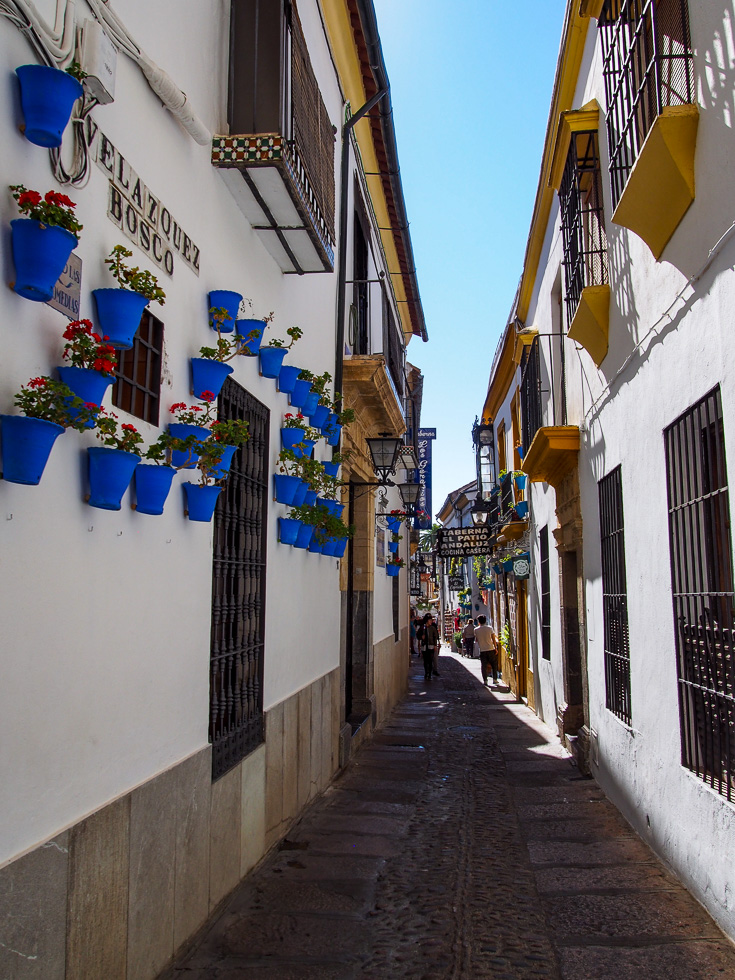
Beautiful corners of Córdoba, Spain
By the way, if you like my posts about how language integration enriches the travel experience, be sure to check out my post about learning Guatemalan slang from kind strangers in Cobán, Guatemala, as well as my post about learning Arabic in Tangier, Morocco. Also, don’t miss my tips for how to drastically improve in a foreign language… without traveling!
How do you say “quickie” in Spanish?
My first month living in Sevilla was challenging for many reasons. I struggled majorly to understand the local accent, called andaluz. Andaluz is notoriously challenging, complete with “eaten” letters, rapidfire delivery, and lots of slang and colloquialisms. I had been studying Spanish for many years before living in Sevilla, so I was generally able to express myself in Spanish… but I rarely understood the andaluz that was fired back to me. Imagine the frustration of only understanding one half of your conversations, for weeks.
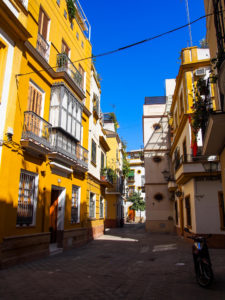
Pretty streets in Sevilla’s centro histórico – a great place to go for a walk on a sunny day!
During this first month I was also fairly lonely, as I hadn’t quite figured out yet how to meet locals and make friends. One sunny day after lots of friendless moping about, I decided to go for a walk through the city center and enjoy the sunshine. As I approached the university of Sevilla, I was stopped by a guy, let’s call him Juan, who was about my age and was selling postcards to raise money for charity. Sounds simple enough, but it took me about five minutes just to understand his pitch, because his accent was so thick and so andaluz that every sentence he uttered sounded kind of like this: “hlasyjuanyestyvndiendopstals.” Simple, right? But after lots of me asking him to repeat himself and many yes or no questions, I was kind of able to follow him.
Then Juan looked at me curiously, and started asking me some questions about myself. And then expressed that he wanted to get to know me better, and would I want to “iralaunvrsidaddesvllay–“
I was able to pick out bits and pieces, but most of what he was saying sounded like incomprehensible garble. University of Sevilla. Break in 10 minutes. Get to know me. I proposed a cup of coffee at one of the many cafes within 10 feet of us. Hey, you never know who could become a new friend. Lonely and desperate to meet locals, I was open to pretty much anything.
Until, of course, Juan made a face at my suggestion to coffee, and then brought up the university of Sevilla again and specifically mentioned the bathrooms, and the phrase “relaciones cortas” aka short relationships… and then finally, after about 10 tortutous minutes of this conversation, I realized he was asking me for a quickie in the bathrooms at the university of Sevilla… No, gracias.
I felt the heat rush to my cheeks. I was too flustered to give him a properly outraged rejection, so I just stammered “no!” like 25 times and then extricated myself from the conversation as quickly as possible. After the shame of the interaction wore off, I let this be a learning experience. It’s okay that I wasn’t fluent enough to parse out this guy’s creepy come-on. A few months later, when we bumped into each other again, I was able to quickly and eloquently skirt the conversation without even slowing my feet. Score.
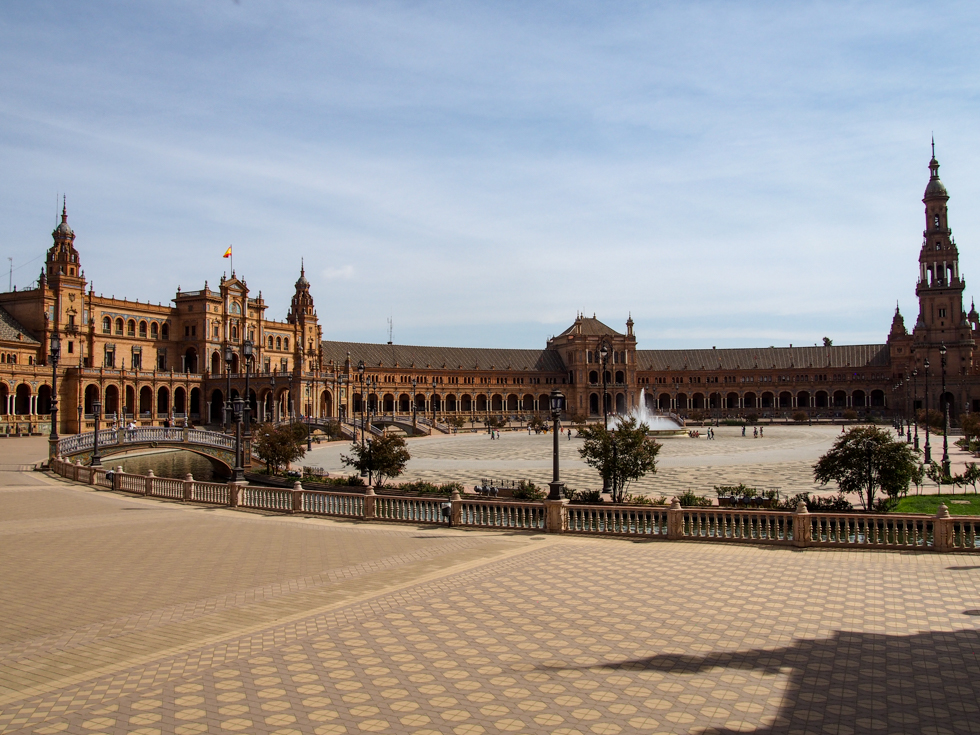
When I bumped into Juan many months later it was actually here, outside of the Plaza de España – true story
You apparently can’t just invent shorthand
For many months while living in Spain, I was incredibly confused by the phrase “buenas!” I had never heard it before, but suddenly I was hearing it all the time. Of course, to my still relatively untrained ear, “buenas!” sometimes sounded like “buenas!” and sometimes sounded like “buenos!” Since I had a hard time distinguishing what I was hearing, I assumed I was just hearing them both, and that they must be a shorthand for “buenos días” or “buenas noches.” Which makes sense, especially considering that in English we have shorthand for “good night”, the shorthand being “‘night!”
So I spent months convinced that this was the explanation behind the perpetually confusing “buenas!”, until it was finally cleared up for me one night during the end of my stay in Sevilla. I was having a sleepover with a friend of mine, and we stayed up really late talking. Finally, in the wee hours of the morning, we turned out the lights and got into bed. Lying side by side in the darkness, my friend said, “buenas noches.” And I, in my sleepy shorthand, responded, “buenas!”
There was a long pause. And then my friend burst out laughing.
“Qué!? Qué dije?” (“What did I say?”) I asked, beyond confused. And then my friend kindly explained to me that “buenas!” means “hola!”. I blinked in the darkness. Seriously?
I started to giggle. “I thought it was shorthand,” I told her. Like ‘night!
Nope. We both burst out laughing. When the risa finally subsided, she said, “buenas noches,” to which I dutifully responded, “buenas noches.”

Barbed wire silhouette and the sunset over the rio Guadalquivir in Sevilla, Spain
Come on baby, light my fire
One amazing experience that I had while living in Sevilla was attending the famous feria de abril, colloquially called the feria. The feria is a six-day-long party, during which time attendees eat traditional tapas, drink rebujitos, dance sevillanas, wear trajes de flamenco, and partake in all-day (and all-night!) festivities. The feria kicks off on a Monday night with the lighting of a giant structure called the portado, or gate.
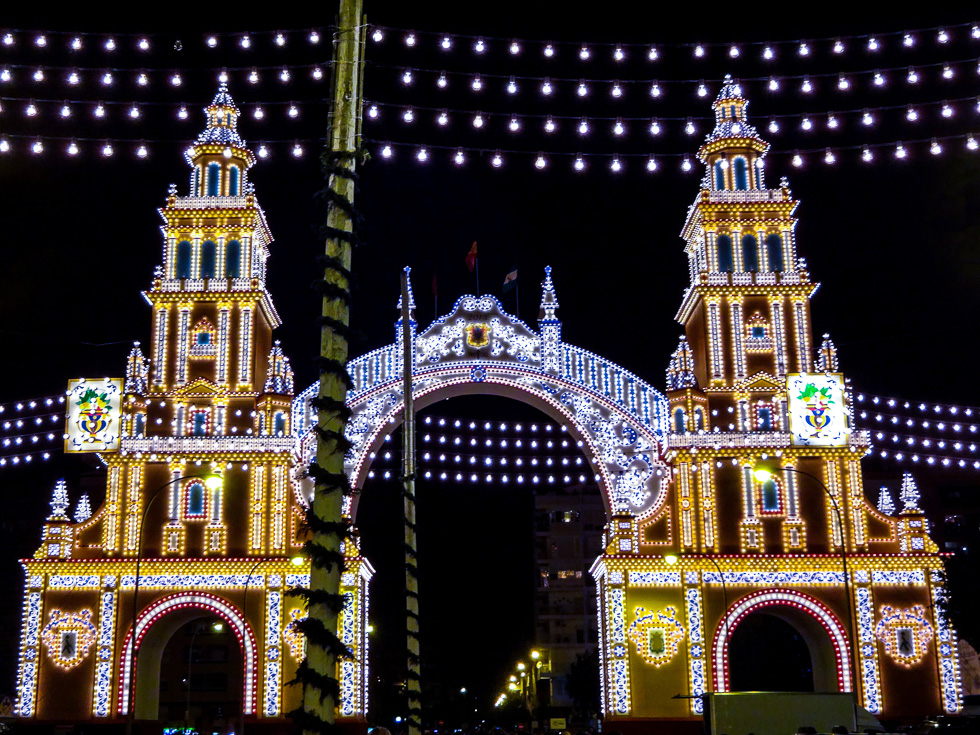
The portado all lit up on the opening night of the feria de abril in 2013
On the Tuesday morning after the first night of the feria, I was in the kitchen with my host family. My host father asked me if I had gone out the previous night. Of course I had gone to see the lighting of the portado. The verb in Spanish for “to light up” is alumbrar. Also, in Spanish the suffix “miento” turns a verb into a noun (i.e. estacionar = to park [verb] and estacionamiento = parking space [noun]).
So I told my host father, “Sí, fui a ver el alumbramiento.” Aka that yes, I had gone to see the lighting.
He paused, then said, “El alumbrado.”
“Uh huh,” I responded absentmindedly, his correction rolling over me. I later left the room, gathered my things together, and left the apartment. In the hallway, I mulled over the brief dialogue. Alumbramiento. Alumbrado. I was sure that alumbramiento meant, essentially, “the lighting”, so why… And then it hit me. Not “the lighting”, but rather “the birth!” As in, the baby being born. I knew that the word had sounded familiar! But of course, by mixing them up I had inadvertently told my host father that I had gone to see the birth! Qué vergüenza! I immediately rushed back into the apartment and found my host father again, still in the kitchen.
“No fui a ver el alumbramiento!” I told him. He just laughed.

One of my favorite photos from Spain: the sunset over the feria de abril
Only order items listed on the menu
In Spain, it’s very common to order tapas, or small plates, in restaurants. One typical tapa in Sevilla is called “lagrimitas de pollo”, which is essentially chicken nuggets. One night, I went out for tapas with a friend. In typical Spanish sharing style, we planned to order a few different tapas, one of which would be an order of lagrimitas de pollo.
The waiter came by our table and asked us what we would like to order. I ordered for the two of us. Tortilla de patatas, salmorejo, y… lagrimitas de pollo. Except, I didn’t say “pollo”. Instead, I mispronounced “pollo” as “polla”.
And you see, while “pollo” means chicken, “polla” in Peninsular Spanish means dick. Yes, that dick. As soon as that stray “a” came out of my mouth, I froze, eyes wide. The waiter looked at me. I looked at the waiter. I scrambled. “No, um, pollo! Pollo!” And the waiter just burst out laughing.
In the end, the tapa was delicious. Because it was made from pollo.

Here would have been a good place to put a photo of some typical Spanish tapas… but since I don’t take food photos here’s a torre del oro shot from Sevilla instead
And 5 years later… some things never change
Nearly five years after leaving Sevilla, I returned for a visit in the fall of 2017. It was a lovely trip for many reasons, but it was especially satisfying to see how much my Spanish had improved since the last time I had been in the city. I understood so much more! I was able to clearly express myself, and my español had undergone a major confidence boost after many years of practice and travel throughout Latin America in between.
During my return trip to Sevilla, I stayed with some friends of mine, who are all born and raised sevillanos. I arrived at their house, sleepy but content, after a long flight from New York. It had been a long time since I lived in Spain, so there was certain basic information that I had simply forgotton. Like whether or not I could drink the tap water, that kind of practical stuff. So with my water bottle in hand, I went to my friend to ask if I could drink the water from the sink.
“Puedo tomar de la grifa?”
My friend just cracked a sly smile at me. “De la grifa no,” he replied. No, no, no. “Pero del grifo, sí puedes tomar.”
Okay, I had screwed up the gender of the word, but what did that mean? I looked quizzically at my friend, and he held his thumb and forefinger up to his lips and sucked in some air. The universal pantomime for taking a hit of a joint. Basically, I had just accidentally asked him for some marijuana.
Oops! Okay, sólo agua del grifo, pues.
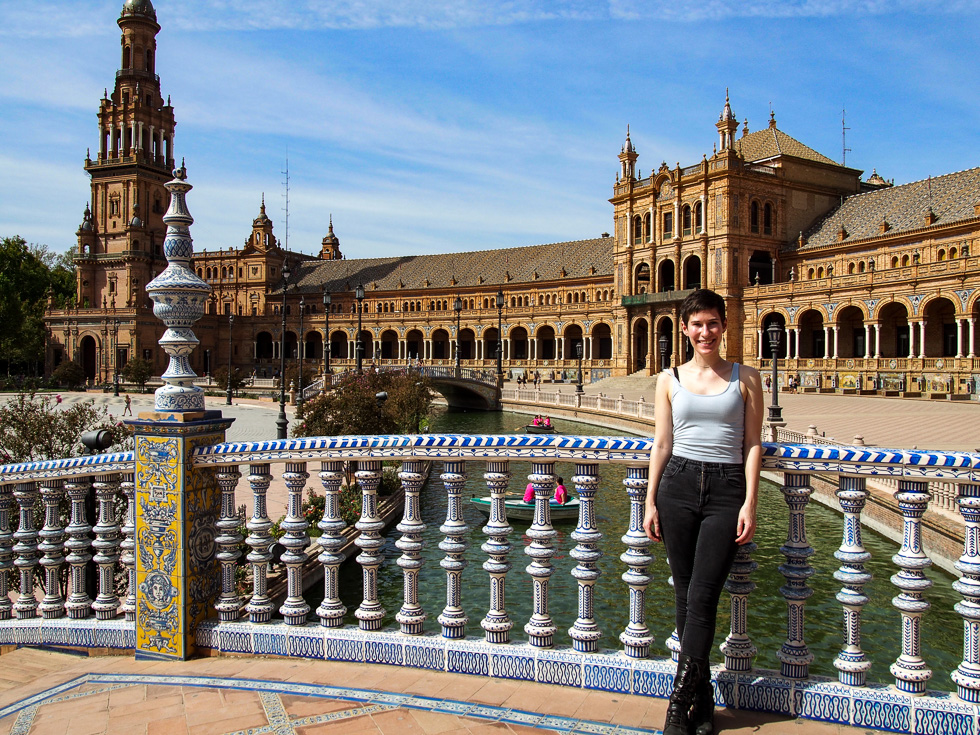
I wear my Spanish language mishaps with pride! Me at the Plaza de España on my most recent trip to Sevilla in the fall of 2017
More Spanish language mistakes to come
For me and for you! That’s just the way it goes when you speak another language, and for as long as I’m on this journey I’m sure to continue making mistakes. Hopefully I’ll always be able to laugh at them. Risa is definitely the best medicine.
Got any language learning mishaps to share with me, in Spanish or otherwise? Do you focus on language learning as part of your travels? What is the most challenging part of language learning for you? (Listening, reading, speaking, etc.?) What is the most rewarding part of language learning for you?
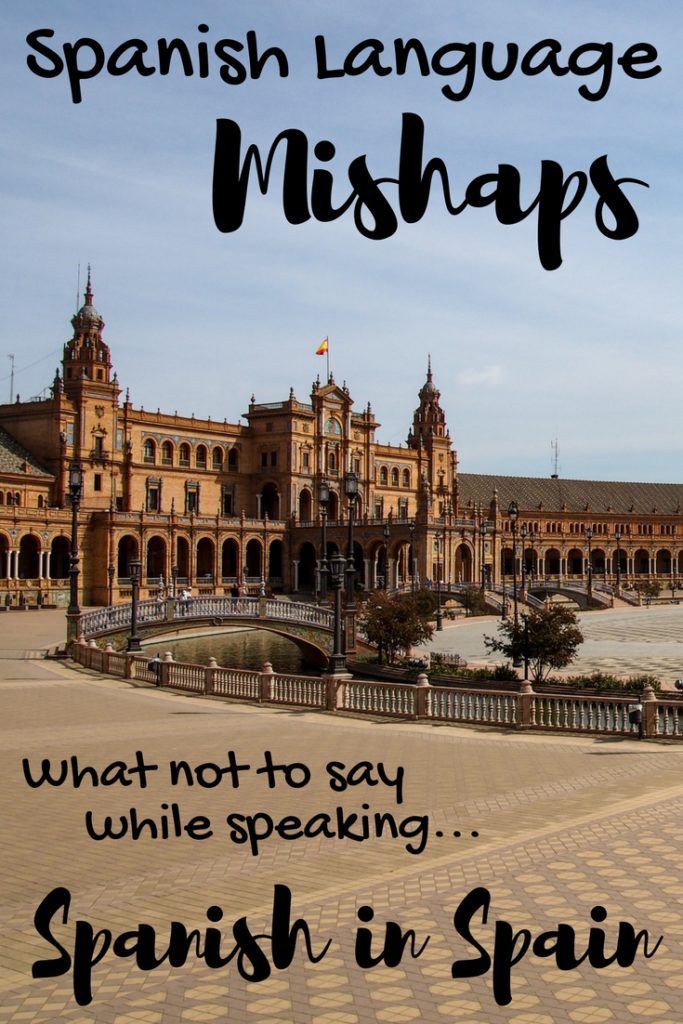









17 comments
I’ve really enjoyed your experience! Have laughed a lot. Actually it’s because I’ve felt the same, but the difference is I’m spanish and been living in the UK for 2 years. All my life learning English and I didn’t understand a word the first weeks. It’s a good experience immersing in a different culture with a different language, hope you had a good time. Night!
Aw, thank you so much, Sergio! I hope that over your two years living in the UK you’ve had many rich experiences with the language, in spite of the challenges in the beginning. Thanks for your kind words and for sharing your experience 🙂
Oh❤️ What an excellent post! And how I adore Seville! I took my baby steps with Spanish there, so it was so nice to be taken back through your lovely pictures and sweet stories.
I have been many Spanish mistakes through – most of which I have luckily forgotten 😉 But the “worst” one is without a doubt moving from Spain Spanish to Argentine Spanish, where “coger” doesn’t have the same meaning… In Spain, it is to take something (e.g “coger el autobús” (as you know) to take the bus). In Argentina, “coger” is to have sex…. Soo.. Don’t ever say “coger el autobús” to an Argentine or in Argentina or people will look very strange at you 😄
Thanks for sharing your stories! Now I really want to visit Seville again!
Haha yes, the coger struggle is real! You get used to using it for everyday stuff in Spain, but I trained it out of my head after a few weeks in Guatemala – didn’t want to offend anyone! LOL. But it’s complicated because in some Latin American countries it’s used like “coger el bus”, and in others it’s to have sex… basically Spanish just keeps you on your toes!
Thanks for reading and for your kind feedback. Enjoy Spanish speaking and more in Argentina!!
Exactly! I studied in Cuba, and there you can without problem say “coger el autobus”. Haha. So true, Spanish keeps you on your toes! But it’s also one of the amazing things about the language that it is so diverse.
Keep rocking Spanish! Chau! 😉
I definitely agree – and good to know about Cuba! Thanks for the insight, Becci! 🙂
I’m learning Spanish now and my grammar is crap so I can totally relate! I’ve learned that it’s better to try and just speak and make mistakes rather than keep quiet, even if you end up with some hilarious stories at the end. My goal is to become conversational and maybe one day fluent!
Definitely!! And going for it and speaking will help you become conversational and eventually fluent. The more I speak the more rapidly I improve. Mucha suerte, Jac!! Thanks for reading and commenting 🙂
Girl, I can relate to this so much. I just moved to Germany and I am learning German, but I live in Bavaria where Bayerische is very different than high German. One day I think I know German and the next I have no idea what is happening. I’ve had issues when people speak English to me when it is their second language. One time I thought a boy was asking “Are you from the U.S.?” I kept saying “yes” when I realized finally he was saying “do you want to have sex.” lol. I was like why is this guy following me around.
Love hearing your story and it is nice to know I am not the only one embarrassing or getting myself pregnant while learning a new language. haha
OMG! That’s unfortunate! I hope that you were able to walk away from the experience and laugh about it, but I know that can be tricky when you’re in these very vulnerable moments of language confusion. Thanks for sharing and the language solidarity! Good luck with your German studies, Susanna 🙂
HAHA this was fantastic! Definitely gonna show this to my friends who I met in Spain because I didn’t even know about some of these.
Thank you so much! Glad you enjoyed it, Sojourner 🙂
Haha, this is hilarious! I’m from Finland and we study quite a lot of languages. I’ve studied Spanish as well but I don’t have any good stories. Lately, I’ve started studying Thais and it’s a tonal language so a word can change A LOT depending on the tone. I’ve heard soooo many good stories. Suddenly an everyday word can turn into very vulgar =D
Aw, I’m so glad that you enjoyed it! And I can definitely imagine about tonal languages – you have to be very aware of pronunciation! I’ve never tackled a tonal language myself – maybe the next one… 🙂 Thanks for reading and commenting, and happy language learning!
Yay i’m so glad you wrote this! I’m spending a few months in Spain next year. I’ll be mostly in Santiago de Compostela but I’ll have to keep some of these things in mind!
Aw, I’m so glad that you enjoyed the post. Best of luck with Spanish in Santiago de Compostela! Thanks for reading and commenting, Kim 🙂
This blog post is hilarious!! Thank you for sharing your mishaps. I learnt Spanish a long time ago. Unfortunately, I now fall into the don’t use, you lose category! I’m now on with trusty Duolingo and trying to remember, so expecting some fun mistakes along the road to fluency!
Helen | http://www.whathelenloves.com